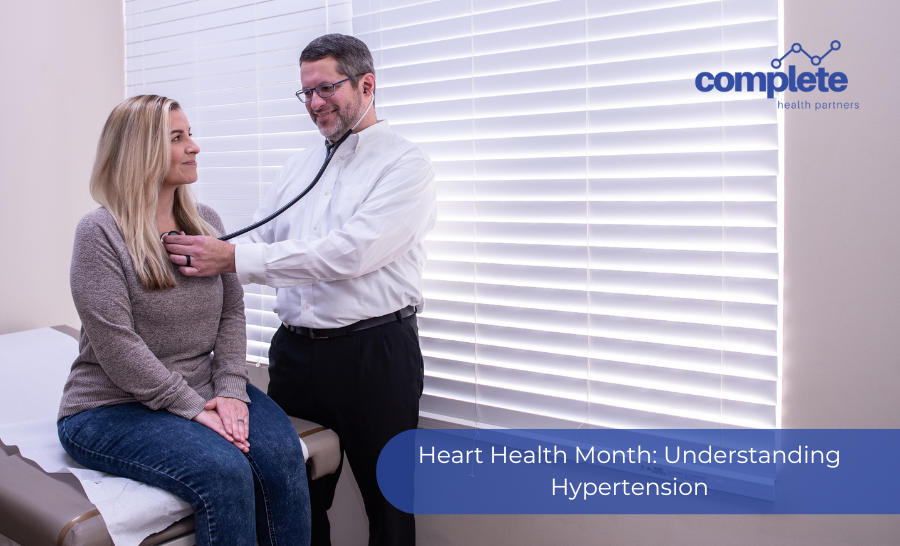Heart Health Month is a great time to focus on one of the most common and silent threats to cardiovascular health: hypertension. Also known as high blood pressure, hypertension is a condition that affects nearly half of adults in the United States, according to the CDC. Despite its prevalence, many people are unaware they have it. Let’s dive into what hypertension is, why regular visits to a primary care provider (PCP) are essential, and how it can be effectively managed.
What is Hypertension?
Hypertension occurs when the force of blood against your artery walls is consistently too high. Blood pressure is measured in two numbers:
- Systolic pressure: The top number, representing the pressure in your arteries when your heart beats.
- Diastolic pressure: The bottom number, showing the pressure in your arteries when your heart rests between beats.
A normal blood pressure reading is less than 120/80 mmHg. Hypertension is generally diagnosed when readings consistently measure 130/80 mmHg or higher. If left untreated, high blood pressure can lead to serious health issues such as heart disease, stroke, kidney damage, and more.
Why is it Important to See a PCP?
Many people with hypertension have no symptoms, which is why it is often referred to as a “silent killer.” Regular check-ups with your PCP are crucial for early detection and prevention. During your visit, your PCP will:
- Monitor your blood pressure: Routine screenings can identify high blood pressure before it leads to complications.
- Assess risk factors: Your PCP will evaluate your family history, lifestyle, and other health conditions that may contribute to hypertension.
- Provide guidance: Your PCP can recommend lifestyle changes or treatments tailored to your unique needs, reducing the risk of serious health problems down the road.
How is Hypertension Managed?
The good news is that hypertension is manageable with the right care plan. Management typically involves a combination of lifestyle adjustments and, in some cases, medication. Here are some of the key strategies:
- Lifestyle Changes:
- Healthy Diet: Focus on a diet rich in fruits, vegetables, whole grains, lean proteins, and low-fat dairy.
- Regular Exercise: Aim for at least 150 minutes of moderate aerobic activity per week. Walking, swimming, and cycling are great options.
- Limit Sodium: Reducing salt intake can significantly lower blood pressure.
- Manage Stress: Practice mindfulness, yoga, or other relaxation techniques to reduce stress levels.
- Medications:
- For some, lifestyle changes alone may not be enough. Your PCP may prescribe medications to help control your blood pressure.
- Regular Monitoring:
- Keeping track of your blood pressure at home with a reliable monitor ensures you stay on top of your numbers between doctor’s visits.
Partner with Complete Health Partners for Your Primary Care
At Complete Health Partners, our primary care team is here to help you take control of your heart health. Whether you need routine screenings, guidance on lifestyle changes, or help managing an existing condition, we’re with you every step of the way. Don’t wait until it’s too late—schedule an appointment with us today to check your blood pressure and discuss your heart health.
6749 Charlotte Pike, Nashville, TN 37209
629.203.7858
9am – 7pm, 7 days a week
166 E Main Street, Hendersonville, TN 37075
615.991.2855
9am – 7pm, 7 Days a week

